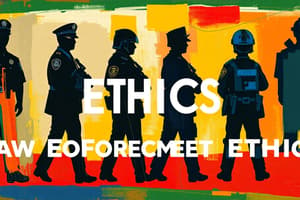Podcast
Questions and Answers
What is a primary characteristic of professionalism in law enforcement?
What is a primary characteristic of professionalism in law enforcement?
- Dismissing public criticism
- Exhibiting integrity and ethical behavior (correct)
- Maintaining personal relationships with offenders
- Engagement in political activities
What does the Law Enforcement Code of Ethics emphasize?
What does the Law Enforcement Code of Ethics emphasize?
- Disregarding laws when convenient
- Favoring connections over duty
- Pursuit of personal gain
- Service to the community and public trust (correct)
Which of the following is a non-physical characteristic of ethical behavior for police officers?
Which of the following is a non-physical characteristic of ethical behavior for police officers?
- Avoiding conflicts of interest (correct)
- Strict adherence to laws and regulations (correct)
- Demonstrating physical strength in confrontations
- Forming biases based on personal beliefs
Which of the following best distinguishes moral courage from physical courage?
Which of the following best distinguishes moral courage from physical courage?
What consequence may result from a police officer engaging in sexual harassment?
What consequence may result from a police officer engaging in sexual harassment?
Flashcards
What is professionalism?
What is professionalism?
Acting in a way that is expected of a professional, showing integrity, competence, and respect for others.
What is the Law Enforcement Code of Ethics?
What is the Law Enforcement Code of Ethics?
The Law Enforcement Code of Ethics outlines the principles and values that guide law enforcement officers' conduct. It emphasizes integrity, honesty, and ethical decision-making.
What is moral courage?
What is moral courage?
Moral courage involves standing up for what is right, even when it's challenging or unpopular. It's about choosing to act ethically, even when it might put you at risk.
What is sexual harassment in law enforcement?
What is sexual harassment in law enforcement?
Signup and view all the flashcards
What are the consequences of inappropriate officer conduct?
What are the consequences of inappropriate officer conduct?
Signup and view all the flashcards
Study Notes
Defining Professionalism
- Professionalism encompasses a set of values, behaviors, and attributes that are expected of individuals in a specific profession.
- It involves adhering to a code of conduct, demonstrating competence, and upholding ethical principles.
- Professionalism is characterized by respect for others, integrity, and a commitment to excellence.
Characteristics of Professionalism
- Maintaining a high standard of conduct
- Demonstrating competence and expertise
- Possessing strong communication and interpersonal skills
- Treating all individuals with respect and dignity.
- Upholding ethical principles and values
- Accepting responsibility for actions
- Continuously striving for professional development
Law Enforcement Code of Ethics and Canons of Ethics
- A comprehensive set of principles that guide police officers in their professional conduct.
- These codes emphasize honesty, integrity, and fairness in the performance of duties.
- Specific canons describe the expected ethical behavior within law enforcement.
Ethical Role of Police Officers
- Upholding the law, protecting the public, and ensuring justice
- Maintaining impartiality and fairness in all interactions with the public
- Providing support and assistance to those in need
- Preventing crime and maintaining order.
- Respecting constitutional rights during interaction with citizens
- Conducting investigations fairly and without bias
Components of Consistent Ethical Behavior
- Honesty and integrity in all actions, decisions, and communications
- Adhering to established policies and procedures
- Demonstrating accountability for actions and omissions.
- Maintaining confidentiality when necessary
- Showing consideration and respect for all individuals
- Being impartial in interactions with citizens
Navigating Ethical Dilemmas in Law Enforcement
- Identifying the ethical issues involved, considering different perspectives
- Evaluating the potential consequences of each possible course of action
- Seeking guidance from policies and training materials and/or supervisors.
- Ensuring transparency, accountability, and appropriate actions in ethical dilemmas
Physical vs. Moral Courage
- Physical courage involves confronting physical danger and risk, while moral courage involves acting in accordance with one's values even when faced with opposition or criticism.
- Both are crucial for professionals, particularly in law enforcement but one is not necessarily superior to the other.
State and Federal Laws Related to Officer Behavior
- Laws regarding officer conduct vary by state, but there are also federal laws that apply.
- Such laws govern areas like use of force, officer misconduct, and protection of civil rights.
Civil Penalties for Harassment and Inappropriate Conduct
- Civil penalties for sexual harassment and inappropriate conduct can include fines, court orders, and other legal remedies.
- The severity of penalties varies depending on the specific violations and circumstances.
Studying That Suits You
Use AI to generate personalized quizzes and flashcards to suit your learning preferences.




